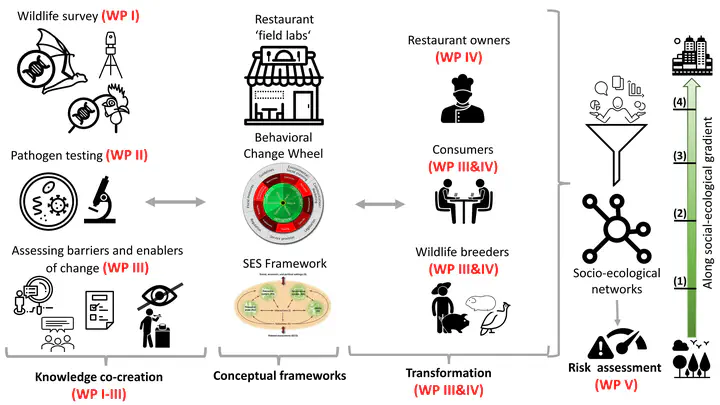BehaviorChange
 Project concept
Project concept
Landscapes are increasingly dominated by agroforestry, infrastructure and urbanized areas, and wildlife communities are changing dramatically. West African wildlife, including bats, primates, rodents or ungulates host a wide spectrum of pathogens, some of them with zoonotic potential, such as Coronaviruses, Monkeypox and Ebola virus. Some species only remain in marginalized natural habitats, other species thrive and increase in abundance, a situation referred to as post-depletion sustainability. These dynamics have critical consequences of global relevance regarding the reorganization of interactions at the human-wildlife interface and, thus, opportunities for zoonotic disease emergence. Such increasing anthropogenic influences require a shift of thinking from public health towards planetary health, which requires the collaboration of researchers from multiple disciplines and societal stakeholders.
Habitat co-use and wildlife exploitation (hunting, trading, consuming) take place within a complex social-ecological system (SES) with spatial and temporal variability, social and governance drivers, and multiple-scale processes. Thus, addressing the risks associated with human-wildlife contacts requires transdisciplinary integration of practical and theoretical knowledge to support scientifically valid and socially relevant transformation processes. In terms of ecological factors, higher wildlife host density correlates with the spread of infectious diseases, while outbreak risk in high-biodiversity environments could be lower. Simultaneously, people in the tropics still rely on wild meat as a protein source and build their livelihoods around the wild meat supply chain. Hunting and trading are important for people to earn a living, however, especially in urban areas consumption is not essential. Demand for wild meat has been linked to higher income levels which combined with rapid urbanization threatens biodiversity. Therefore, previous studies of the wildlife supply-demand chain in West Africa suggest to focus on consumers to reduce wildlife exploitation. Wild meat is consumed because of a combination of behavioral factors such as beliefs, cultural traditions, and social norms. Wild meat is seen as a symbol of wealth and status, perceived as fresh, tasty and healthy, and part of people’s cultural identity.
These are all factors that could be effectively targeted by behavioral change interventions (BCI) to reduce demand for wild meat. Rigorous evidence on the effectiveness of interventions aimed at changing consumer behavior is still lacking even though the behavioral sciences provide an ever-growing toolbox for designing BCI. For choosing the appropriate tools to design a scalable intervention in a given context it is crucial to understand underlying drivers and co-dependencies of targeted behavior. To diagnose the different contexts we will systematically employ the SES framework and the Behavioral Change Wheel (BCW) using both qualitative and quantitative approaches to design effective BCI for altering wild meat consumption and associated risk. Applying the SES and the BCW requires expertise in anthropology and behavioral sciences, but also critical reflection in an inter- and transdisciplinary team of scientists and stakeholders integrating differing knowledge systems, values, and processes.
The idea of the proposed project is, therefore, to study human-wildlife contact across social-ecological contexts (SEC) ranging from rural areas close to pristine habitat and degraded landscapes up to flourishing urban centers with focus on wildlife consumers and their capabilities, opportunities, motivations, and environmental contexts for identifying entry points for successful BCI to reduce the risk of zoonotic disease emergence.